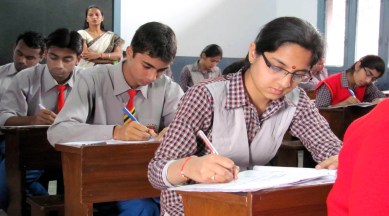Stay updated with the latest - Click here to follow us on Instagram
NCF changes for school education spark concerns among school principals and educators
The NCF for school education states that students in Classes 10 and 12 will be allowed to take board examinations on at least two occasions during the school year, with only the best score being retained.

Following the release of the National Curricular Framework (NCF) for school education on Wednesday, school principals and educators in Delhi raised a range of concerns about logistical challenges that could arise from holding board examinations at least twice a year, the pace at which changes were being introduced and needing more details on implementation.
The NCF for school education states that students in Classes 10 and 12 will be allowed to take board examinations on at least two occasions during the school year, with only the best score being retained. “In due course, Boards of examinations should develop capacities to offer ‘on demand’ examinations,”as per NCF.
monthly limit of free stories.
with an Express account.
Minakshi Kushwaha, Principal, Birla Vidya Niketan, said: “I’m not sure how convenient board exams twice a year would be, unless the pattern is changed. There is a trend of giving preparatory holidays before the board exam. These exams then take more than a month to be conducted. This pattern would have to be changed and they may have to be merged into the daily routine.”
Ameeta Wattal, chairperson, DLF Education and Scholarships, said: “When two board exams come in, we are creating two centres of stress within one year. Children would be working around courses all the time. There will be no respite. Otherwise, in the first couple of months, there is a certain ease and things get revved up around November. Here, every few months, we will be in examination mode.”
Sudha Acharya, Principal, ITL Public School, added: “The feasibility and logistics of conducting board exams twice will have to be considered. We take a month-and-a-half to conduct a board exam, evaluate and declare the results.”
The NCF also makes other changes. In Classes 11 and 12, “choice-based courses are to be offered to enable flexibility and choice for students and to remove hard separations between disciplines and academic areas.” Students of these classes are required to study two subjects from language education, at least one of which must be a language native to India.
Kushwaha said, “Two languages are not a bad idea. On choice-based courses, children want to get into either science, commerce, or humanities because Delhi University admissions also make similar restrictions. Higher education will have to be in sync with this.”
Wattal concurred: “Flexibility of courses will work if universities are in tandem. Children should have the opportunity to select subjects of their choice. But more subjects should be added so they can choose.” All changes should be gradually introduced, she added.
Tania Joshi, Principal, The Indian School, said: “It also depends on the mindsets of children and parents. Board exams transform into pressure for students. We need more details on the strategy that will be adopted. It is a paradigm change, and a challenge for schools, parents and children.”